Search Results
161 content pages
Cosmetic Dentistry
It's impossible to overstate the emotional, social and professional benefits that smiling with confidence can give you. If you find you cover your mouth when you smile, or even hold back your smile because you don't want to show your teeth, you should consider what cosmetic dentistry — the art of smile enhancement — can do for you.
The first step in any smile makeover is a thorough dental examination, to make sure that your cosmetic problems really are just that, and not a sign of underlying dental disease. Once your health has been established, your smile can be cosmetically...

Aging and Dental Health
Today, Americans are not only living longer — we're also retaining our natural teeth longer than ever before. But this rosy picture isn't free of thorns: Older adults tend to require increasingly complex dental treatments; are often more prone to contracting certain diseases; and sometimes find it challenging to keep up with daily oral health practices.
Yet maintaining good oral hygiene is critically important as we age. When problems occur in the mouth, they can cause difficulty chewing, swallowing, speaking and smiling — basic functions which can affect both physical and social well-being. It's possible that medications prescribed for other...

Periodontal Flap Surgery
When advanced gum disease (periodontitis) develops, your teeth are in danger: At this stage, the ligaments and bone tissue that surround them are being destroyed, and you could even begin losing teeth! If the disease can't be controlled by non-surgical treatments like cleaning and scaling, then periodontal flap surgery may be your best treatment option.
Flap surgery is today's leading method for treating and repairing periodontal pockets. What are these “pockets?” They are areas below the gum line where gum tissue has detached from the teeth, resulting in an uncleansable space where harmful bacteria can proliferate. These bacteria cause inflammation...
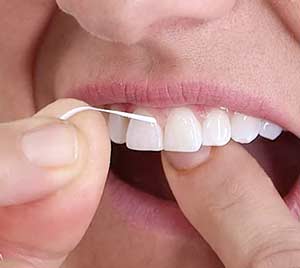
How To Floss Your Teeth
You always brush twice a day, avoid sugary snacks between meals, and go to the dentist regularly. Do you still have to floss your teeth?
The short answer: Yes, at least once a day. Flossing is probably your single most important weapon against plaque, the clingy bacterial biofilm that sticks to the surfaces of your teeth. Plaque is the principal cause of tooth decay; it is also the cause of periodontitis (gum disease), bad breath, and other maladies. Brushing is a good start — but flossing removes plaque in places a brush can't reach, like the small gaps between teeth...
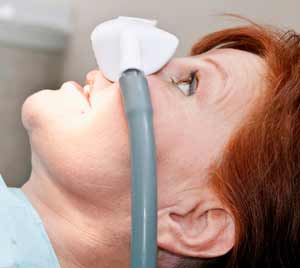
Nitrous Oxide
Some people fail to receive the benefits of dental treatment because of a simple yet seemingly overwhelming problem: Fear. It isn't uncommon to have a little anxiety about an upcoming dental procedure. But if your fears have kept you away from the dental office when you know you really should go — take heart! Conscious sedation with nitrous oxide can help you lose that anxiety, and make the whole experience so stress-free that you may not even remember it when it's over.
Nitrous oxide, a colorless gas with a slightly sweet odor, has been used in medicine for about a...
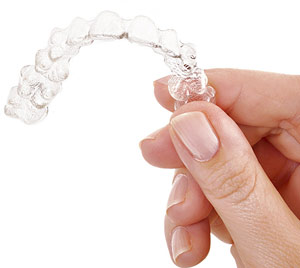
Invisalign Clear Aligners
When you hear the word “orthodontics,” what comes to mind? Probably a young teenager whose teeth are covered by a latticework of metal. There are indeed many orthodontic patients who fit that description. However, there now exists an increasingly popular alternative to traditional metal braces: Invisalign® clear aligners.
As the name implies, Invisalign clear aligners are made of almost invisible polyurethane plastic. Rather than being cemented or bonded to the teeth as metal or clear braces are, clear aligners are completely removable — for important social occasions, for eating, and, most importantly, for tooth-brushing and flossing. This advantage can also...
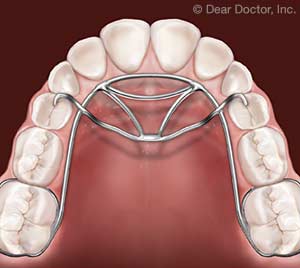
Thumb and Finger Appliances
Is there any image that illustrates the comforts of babyhood better than a sleepy infant sucking his or her thumb? Ultrasound pictures have shown, to the joy of many prospective parents, that this behavior can even occur in the womb. The thumb- or finger-sucking habit seems to relax and comfort toddlers too, and it's perfectly natural. But as a child grows, there comes a point where this habit isn't just socially awkward — it may also be harmful to his or her oral health.
In most children, thumb sucking stops on its own between the ages of two and four...
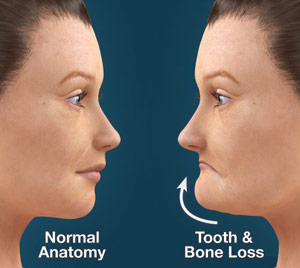
Top Reasons to Choose Dental Implants
The dental implant is today's state-of-the-art tooth replacement method. It consists of a very small titanium post (the actual implant), which is attached to a lifelike dental crown. The crown is the only part of this tooth-replacement system that is visible in your mouth. The implant itself rests beneath your gum line in the bony socket that used to hold your missing tooth. Two, four or more implants can be used to support multiple crowns, or even an entire arch of upper or lower replacement teeth. Whether you are missing one tooth, several teeth or all your teeth, dental implants...

Blood Thinners and Dental Procedures
Millions of people regularly take anticoagulant or antiplatelet medications (sometimes called “blood thinners”) to help prevent heart attack and stroke, and to manage a variety of medical conditions including cardiac arrhythmia and stent placement. While these drugs have proven, life-saving benefits, they can also cause side effects such as increased bleeding. So it may be a cause for concern if you're taking one of them and you need to have a dental procedure.
Anticoagulants are among the more widely used pharmaceuticals today, particularly for heart patients. Some common prescription anticoagulants include heparin, warfarin (Coumadin and generics), clopidogrel (Plavix) and dabigatran...
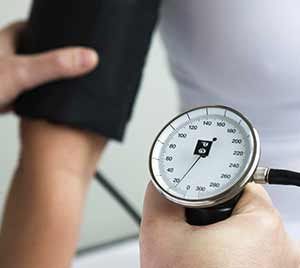
Blood Pressure Medications and Your Gums
Before prescribing any medications — even lifesaving ones, such as those used to reduce blood pressure or prevent epileptic seizures — your health care professionals carefully weigh the benefits a drug offers against the possible risks of taking it, including its potential side effects. In most cases, the side effects are relatively slight: for example, drowsiness, an upset stomach, or minor aches. But in some individuals, particular drugs may produce side effects that are more troublesome.
This is sometimes the case with a class of drugs called calcium channel blockers (CCBs), which are commonly used to treat high blood pressure...

Sleep Apnea and Behavioral Problems in Children
The number of children diagnosed with Attention Deficit Hyperactivity Disorder (ADHD) has been steadily increasing over the past decade. Yet according to a recent study, many children diagnosed with this condition don't really have it; their behavioral problems are actually related to sleep-related breathing disorders (SRBD), such as sleep apnea.
The 2012 study, published in the journal Pediatrics, followed more than 11,000 children for six years, starting when they were 6 months old. The children who had SRBD were 40 percent to 100 percent more likely than kids without breathing issues to develop behavioral problems resembling ADHD by the age...

Howie Mandel
The comedian and TV host talks about life, his 40-year career, and why he loves going to the dentist
It’s an understatement to say that Howie Mandel has a lot going on. He’s the longest-running judge on NBC’s America’s Got Talent, and he judges the newly launched AGT: The Champions as well as hosting the adorably funny Animals Doing Things on Nat Geo WILD. His Deal or No Deal game show has been relaunched on CNBC, bigger and better than ever with new high stakes rules and the chance for viewers to win $100,000. Besides all that, he has a...

Nitrous Oxide for Children
Some children are just too fearful to receive necessary dental care. In that type of situation, conscious sedation with nitrous oxide may be recommended to help make your child's experience of dental treatment stress-free.
Nitrous oxide, a colorless gas with a slightly sweet odor, has been used in medicine for about a century. It's a safe and effective method of administering conscious sedation, which means that a child (or adult) will stay awake during the procedure, but feel completely relaxed — even happy. All bodily functions remain normal during the administration of nitrous oxide, and its effects wear off quickly...

Pregnancy and Your Child's Developing Teeth
Your baby's teeth will not be visible at birth. But believe it or not, they already exist beneath the gums. Children's primary teeth begin forming at about the sixth week of pregnancy, and start mineralizing — building the bonelike inner tooth layer (called dentin) and the super-hard enamel layer that covers it — around the third or fourth month of pregnancy. So if you're pregnant, it's not too early to start thinking about how to make sure your child's teeth are as healthy as possible!
Like everything else having to do with your baby's physical development before birth, much depends...

Covid-19 Dental-Related Complications
The pandemic has had a monumental impact on a variety of aspects of life, and dental health is not an exception. Unfortunately, many people have reported symptoms associated with COVID-19 that have impacted their oral health. There are a variety of reasons why this can happen, but the most common reasons are due to the avoidance of seeking routine dental care during lockdown, as well as side-effects from prolonged mask wearing and pandemic-related stress.
What is Mask Mouth?
When wearing a mask has a negative impact on oral health, this is called mask mouth. Mask mouth develops due to a...